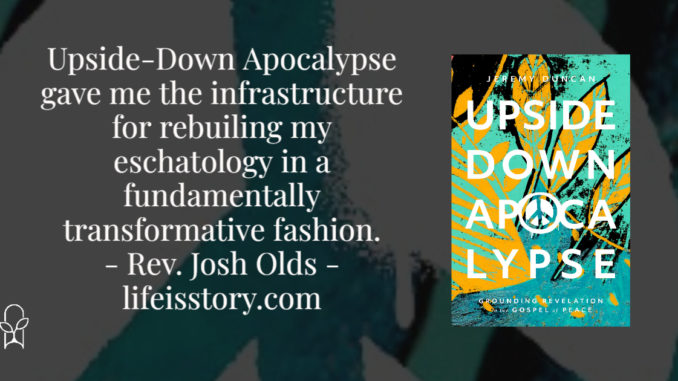
Published by Herald Press on July 5, 2022
Genres: Non-Fiction, Theology
Buy on Amazon
Goodreads

A peacemaker’s guide to the book of Revelation
The book of Revelation—which deals on a cosmic scale with good and evil, politics and empire, community and eternity—has intrigued and frustrated readers since it was written. How do we make sense of John’s prophetic vision of cosmic war in light the nonviolence Jesus embodies in the gospels? What does it mean to tell us about Jesus, our world, and the future of all things? As End Times conspiracy theories surge, it’s more important than ever that we read the final book of the Bible without distorting the true message of Jesus. In Upside-Down Apocalypse, author Jeremy Duncan draws on biblical scholarship and nonviolent theology to guide readers through the book of Revelation, understanding the vision of John in the light of the Jesus we know through the Gospels—the full revelation of the Divine. Along the way, readers will discover what the writer imagines as he weaves this profound revelation of non-violent triumph and see with fresh eyes how the Prince of Peace turns violence on its head once and for all.
I went through a Left Behind phase growing up. Read the adult books before the kids books. Read the prequels and sequel and non-fiction associated the Tim LaHaye School of Prophecy. Eventually even went to seminary at Liberty University. Ok, so it might have been more than a phase. But at some point—between arguing with my amillennialist pastor and insisting that the two witnesses couldn’t be Elijah and Moses, but must be Elijah and Enoch (since it is only appointed once for men to die)—I began to become a bit jaded on the whole premillennial dispensationalist eschatology thing. It just didn’t line up. Or rather, it lined up too neatly. As I began to explore one dispensationalist works—Late Great Planet Earth on through to anything written by Mark Hitchcock—I began to see the sloppy exegesis and the outright absurdities. Having been socialized and academized in Left Behindism, though, I found it difficult to work my way out. I had become convinced that premillennialism wasn’t a faithful interpretation of Scripture but wasn’t convinced preterism was either. In the end, I became a panmillenialist (it’ll all pan out in the end…it’s an old premil joke). There was simply too much to focus on in the here and now to develop a whole new eschatology. And then in waltzes Jeremy Duncan with Upside-Down Apocalypse.
While there’s still some questions I have and while not every contention I have is sufficiently answered, Upside-Down Apocalypse gave me the infrastructure for rebuilding my eschatology in a fundamentally transformative fashion. Instead of presenting the Apocalypse as a gruesome war or display of wrath, Duncan flips the script (back to its proper orientation) to ground the book of Revelation within Jesus’s message of peace. The unveiling of Jesus Christ is made clear not as a message of doom and gloom and wrath, but a message of God’s love prevailing over creation as all things are made new. It’s a paradigm-shattering message of hope and grace.
One of the things I appreciated about Upside-Down Apocalypse is that it didn’t try to be a commentary—even though I would definitely appreciate an exegetical commentary from this perspective. Duncan’s theology and exegesis is robust, but he writes in a style that’s highly readable and accessible. He isn’t here to defend his position or contrast his position with more popular eschatologies. Rather, he simply provides a different lens for interpretation and allows the text to speak for itself. He doesn’t fight for the rightness of his position but relies on the strength and clarity of his interpretation.
My only criticism is that while his interpretation is clear, the content can sometimes get a bit muddled. Maybe it’s because the premil folk love a good chart, or maybe it’s because I needed to read this book with the Bible open at my side, or maybe because it was so foreign a concept to me and premil, pretrib is so ingrained in my thinking, but I kept getting lost in the text a bit, trying to figure out where exactly we were in Revelation’s narrative. I definitely need to sit down with a highlighter and make a second read-through.
Upside-Down Apocalypse invites readers to imagine a different kind of apocalypse, one set within the context of God as love, and God as the Divine which makes all things new. It’s a refreshing, hopeful, and healing perspective that Duncan grounds in solid exegesis and biblical interpretation.
